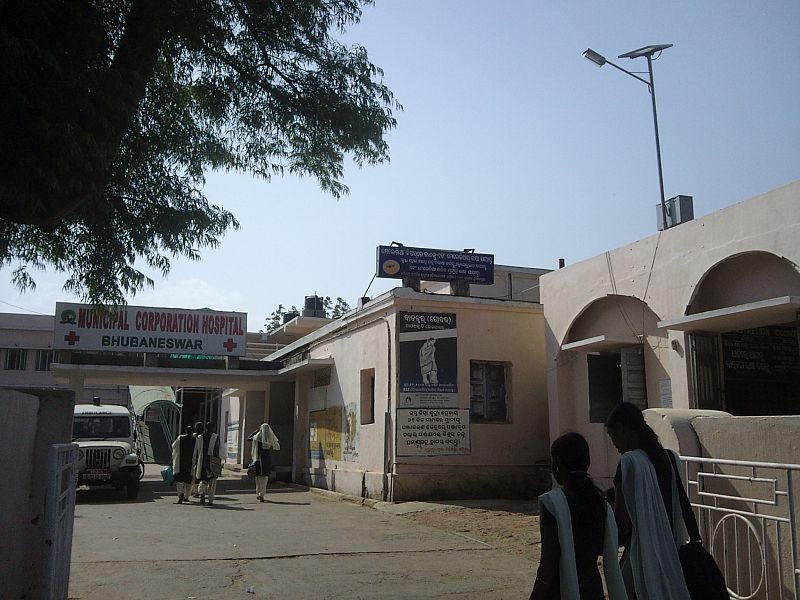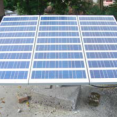To improve health services for the poor in the city of Bhubaneswar, resulting in greater local socio-economic development and reduction in fuel poverty
 With this project ICLEI South Asia aimed to promote the application of renewable energy and energy efficiency in urban health services in India. Following the identification of appropriate appliances, the pilot project at a hospital in Bhubaneswar, state capital of Orissa, showcase the significant existing potential of this technology. This hospital was equipped with solar energy technologies and efficient light bulbs and fans. The project demonstrated that renewable energy and energy efficiency applications could be technologically, financially and environmentally feasible in the urban health sector in India. The successful implementation and the economic and environmental benefits of the project were disseminated and might increase the confidence of local governments and lead to further replication in India or globally.
With this project ICLEI South Asia aimed to promote the application of renewable energy and energy efficiency in urban health services in India. Following the identification of appropriate appliances, the pilot project at a hospital in Bhubaneswar, state capital of Orissa, showcase the significant existing potential of this technology. This hospital was equipped with solar energy technologies and efficient light bulbs and fans. The project demonstrated that renewable energy and energy efficiency applications could be technologically, financially and environmentally feasible in the urban health sector in India. The successful implementation and the economic and environmental benefits of the project were disseminated and might increase the confidence of local governments and lead to further replication in India or globally.
Background
Over the past 50 years India's urban population has been dramatically increasing, with most people living in slums or other substandard dwellings. People in these low-income communities face major health hazards due to poor living conditions, lack of hygiene and sanitation, dependency on untreated water supplies and significant exposure to indoor air pollution. Most of the inhabitants depend on health care services provided by local government. The level of health service provided varies from city to city and local governments are becoming increasingly concerned about their ability to meet their social obligations in the health sector. At the same time, most Indian cities are facing a severe energy crisis, which also has a negative affect on health care services. Recognising the serious nature of these problems, the issue of energy in the urban health sector in India was addressed by a project carried out by the South Asian group of ICLEI - Local Governments for Sustainability. The project team focused on identifying and implementing renewable energy technologies and efficiency measures within hospitals. Hospitals are large consumers of energy; they need power supply for lighting common areas and operating theatres, providing hot water, refrigerating vaccines and medicines etc. Additionally, alternative sources of energy are needed for emergency services during power shortages. Initially, ICLEI carried out a detailed assessment of the energy consumption in local authority health care facilities in the city of Bhubaneswar, India. One hospital was then chosen as a pilot project to demonstrate that renewable energy technologies and energy efficiency strategies could be a way of tackling the hospital's energy issues. An expert conducted an energy audit at the hospital in order to identify possible areas of intervention. Based on the results of this audit, recommendations for action were formulated. The proposed technologies were: a solar photovoltaic power plant, solar water heating installations, a solar- powered vaccine refrigerator, solar lighting systems with energy efficient light fixtures and efficient ceiling fans. The necessary equipment was procured and installed and then the hospital staff was trained in the operation and maintenance of the equipment so that they would be able to use it on a daily basis.Technology, Operations and Maintenance
 The site chosen for the pilot project is a two-storey hospital facility spread across two buildings covering a total area of 14,000 m2. It is the second largest hospital in the city of Bhubaneswar with approximately 300,000 - 400,000 people living in its catchment area.
The technologies installed encompass a 1.28 kW photovoltaic power plant that is designed to provide backup power for 4 hours per day. With full radiation it can convert up to 5 kWh of electricity. In addition, a solar water heating system with a flat plate collector was installed. This system can provide 200 litres of hot water per day to cater for the needs of the gynaecological department and the operating theatres. A solar-powered refrigerator was also installed, which helps to ensure the safe and efficient preservation of temperature sensitive vaccines, e.g. live polio vaccines and other biological materials. In addition, internal and external solar lighting systems were installed – a total of 8 sets indoors each with 9W capacity and one 11W weather proof external light set. The efficiency measures included the replacement of regular light bulbs with compact fluorescent lights (CFLs) (T5 28 W TFLs and 25 W CFLs), which are four times more efficient. Finally, regular heavy weight ceiling fans were exchanged for energy efficient fans that consume far less electricity for the same level of performance.
Trained hospital staff will carry out the daily operation and maintenance of the systems, but the suppliers are responsible for the annual maintenance of the equipment for the first 3-5 years.
The site chosen for the pilot project is a two-storey hospital facility spread across two buildings covering a total area of 14,000 m2. It is the second largest hospital in the city of Bhubaneswar with approximately 300,000 - 400,000 people living in its catchment area.
The technologies installed encompass a 1.28 kW photovoltaic power plant that is designed to provide backup power for 4 hours per day. With full radiation it can convert up to 5 kWh of electricity. In addition, a solar water heating system with a flat plate collector was installed. This system can provide 200 litres of hot water per day to cater for the needs of the gynaecological department and the operating theatres. A solar-powered refrigerator was also installed, which helps to ensure the safe and efficient preservation of temperature sensitive vaccines, e.g. live polio vaccines and other biological materials. In addition, internal and external solar lighting systems were installed – a total of 8 sets indoors each with 9W capacity and one 11W weather proof external light set. The efficiency measures included the replacement of regular light bulbs with compact fluorescent lights (CFLs) (T5 28 W TFLs and 25 W CFLs), which are four times more efficient. Finally, regular heavy weight ceiling fans were exchanged for energy efficient fans that consume far less electricity for the same level of performance.
Trained hospital staff will carry out the daily operation and maintenance of the systems, but the suppliers are responsible for the annual maintenance of the equipment for the first 3-5 years.
Financial Issues and Management
Environmental Issues
There were a number of beneficial environmental outcomes of the project. Solar power replaced the fossil fuel-based energy that was previously used to provide backup energy during a power shortage. Also, by changing to energy efficient technology within the hospital buildings, less grid electricity is now required. This has resulted in estimated emissions savings of 200,000 kg CO2/year.Social Issues
Improving the reliability of the hospital's energy supply and providing the equipment to refrigerate vaccines and medicine has helped to provide a satisfactory quality of health service for the urban poor who mainly frequent the hospital.Results & Impact
 One hospital in the city of Bhubaneswar was equipped with a variety of solar energy technologies and efficient light bulbs and fans. The project demonstrated that renewable energy and energy efficiency applications could be technologically, financially and environmentally feasible in the urban health sector in India. The new energy efficient approach at the hospital became a showcase for the participants of the Climate Roadmap Sub-national Workshop in 2009. Furthermore, the mayor of Bhubaneswar has promised to take steps to include renewable and efficiency strategies in the future development of the city.
One hospital in the city of Bhubaneswar was equipped with a variety of solar energy technologies and efficient light bulbs and fans. The project demonstrated that renewable energy and energy efficiency applications could be technologically, financially and environmentally feasible in the urban health sector in India. The new energy efficient approach at the hospital became a showcase for the participants of the Climate Roadmap Sub-national Workshop in 2009. Furthermore, the mayor of Bhubaneswar has promised to take steps to include renewable and efficiency strategies in the future development of the city.
Replicability
Within the Bhubaneswar Municipal Corporation area there are 6 public hospitals, 2 private hospitals, 17 government dispensaries and about 20 nursing homes, as well as many private clinics. All these sites could potentially benefit from renewable energy technologies and efficiency measures. However, there is no commitment at present from local government to make further investment in this area. Additionally, each health center has different conditions (i.e. building construction, energy demand, etc.), which means that a bespoke plan would be required for every single health center. On the other hand, India's local governments have begun to appreciate the importance of renewable energy sources and energy efficient technologies. The successful implementation and the economic and environmental benefits of the project might increase the confidence of local governments and lead to further replication in India or globally.Lessons learned
Overall the project has proven that renewable energy sources and efficiency installations can reduce energy use in a hospital, while also providing energy security. Despite this, funding will be difficult to secure as local governments already struggle to fulfill their obligations in the health care sector. Additionally, the maintenance of the installations is not assured after the initial 3-5 years, which could become a problem if funding for repairs cannot be found.Projects with same technology
German-Mexican joint project for energy efficient lighting
Exchange: Community Trainers for Renewable Energy Technology Use in Sustainable Food Production and Water Management
The focus of this exchange activity is a social alliance and collective learning process between NGOs and rural communities from three regions of Colombia (Santander, Córdoba and Antioquia). It is based on the accumulated results achieved previously in a WISIONS supported project and ongoing community work in the field of renewable energy and sustainable livelihood strategies.
Projects in same country
Empowering Rural Entrepreneurs in India
The project aims to demonstrate the viability of a hybrid hydro power plant consisting of a hydrokinetic turbine and photovoltaic panels to power a local rice and flour mill, while also enhancing the population’s wellbeing (e.g. by improved lighting).